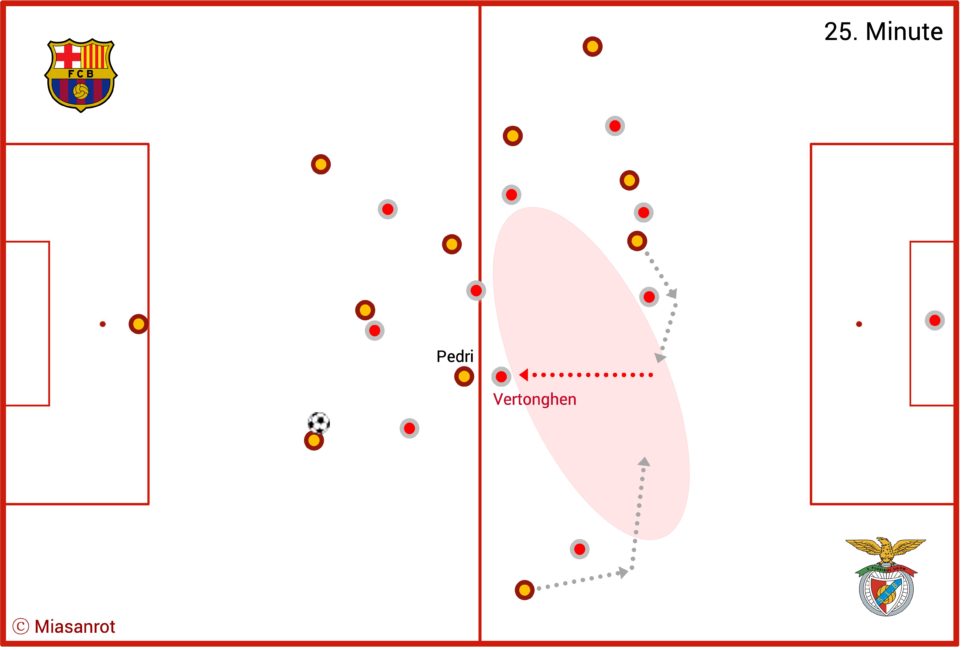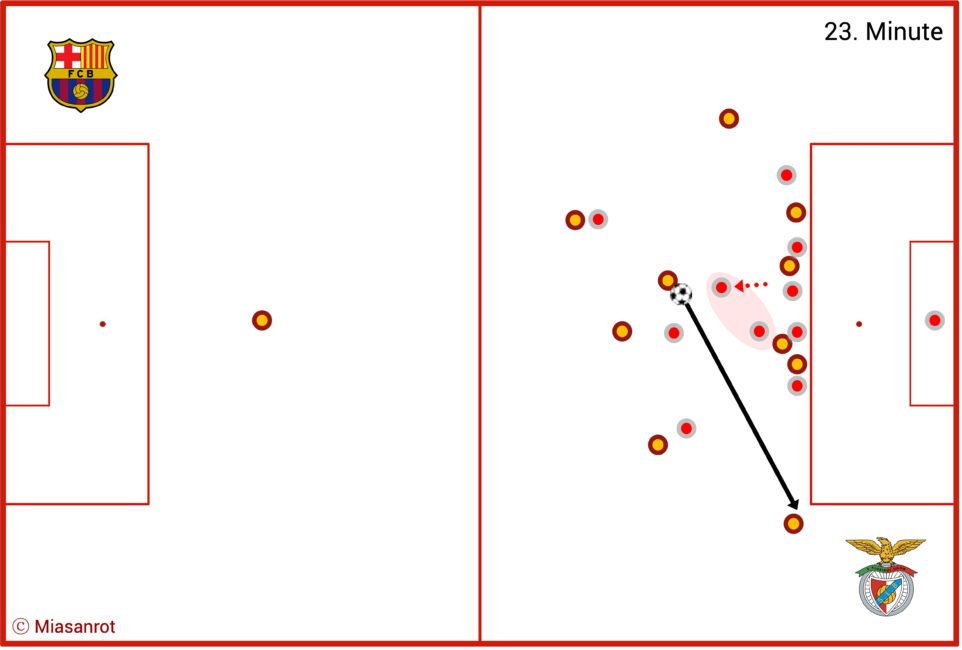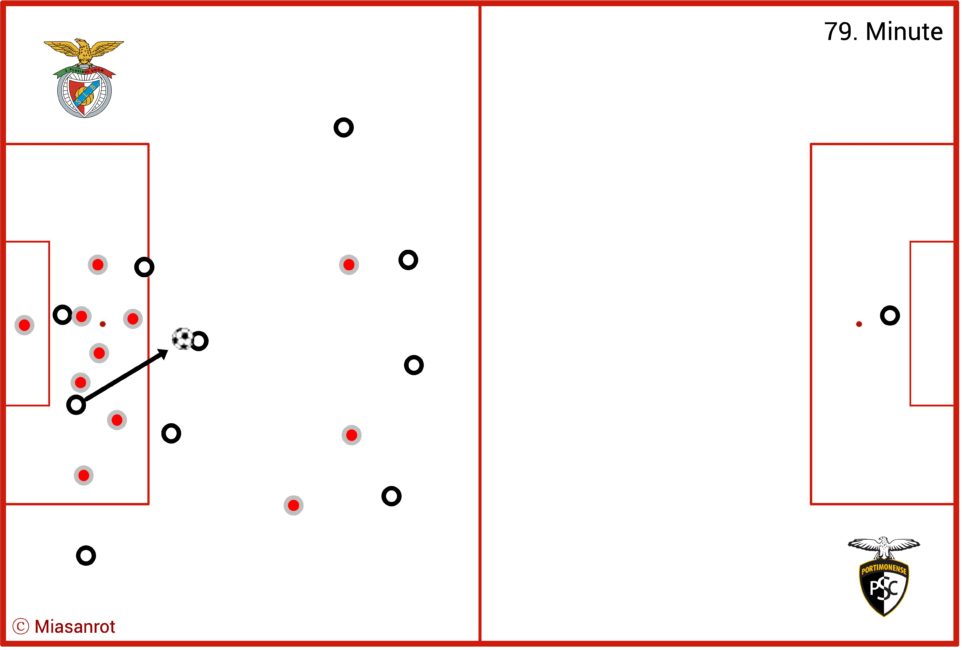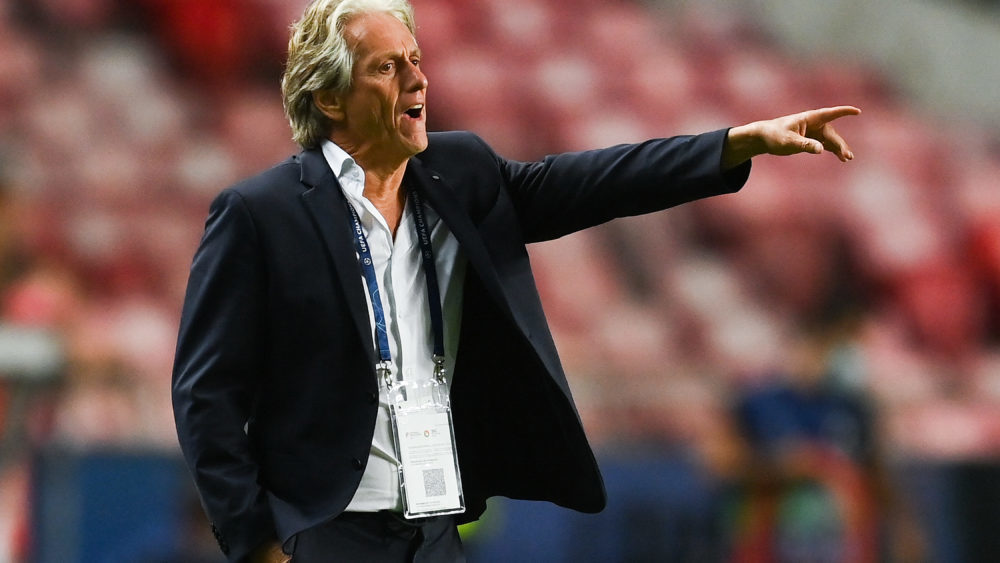Champions League Group Stage MD 02: Bayern vs. Benfica
In a group with FC Barcelona, Benfica and Dynamo Kyiv, it should really only be a matter of who finishes third to qualify for the Europa League for the latter two, while Bayern and Barça decide the group win between themselves. It should.
However, as it turns out, this expectation has been completely upset by reality after only two matchdays. Yes, Bayern are currently leading with six points, but everything is still wide open in the contest for the other three places. Barcelona are in last place with zero points, Kyiv earned a draw against Benfica and they are second – well within reach of earning the top spot by beating Bayern on matchday 03.
This is not as far-fetched a scenario as it may appear at first glance despite Bayern’s great performance at Leverkusen last weekend. Benfica have also made a strong start to the season. They have won 12 of their 15 competitive matches so far and lost only one – before the international break against Portimonense (0-1). Now coach Jorge Jesus wants to continue his team’s strong start by beating Bayern.
In the home match against FC Barcelona, Benfica showed what high quality they have both individually and as a collective. In the domestic league, they dominate their opponents pit of a dynamically organised back three in possession, which allows them to gain time on the ball. Especially close to the ball, the Portuguese team ist exceptionally good at providing passing options and freeing themselves from pressure with quick switches of the play.
What to expect from FC Bayern
Julian Weigl is a key player for Benfica. The former national player has hardly been in the public eye in Germany since his transfer to Benfica. Yet he has developed into a real key player there. The 26-year-old has the best passing rate in the squad (around 92%) and is the lynchpin in midfield. His positioning and passing are crucial for the balance between defence and offence.
Especially in offensive transition moments, he is an essential factor for playing the ball quickly and precisely to the top where the fast attackers look for runs in behind. Barcelona had to pick up the ball out of their own net after just two minutes because they had been overwhelmed by this speed of action early on.
In the Champions League, Benfica also tries to control the game as much as possible through possession. Against Barcelona, however, they only managed 40%. Accordingly, they had to act flexibly, which they did well in many phases.
Strengths with the ball
In the 3-0 win over the Catalans, they switched between higher midfield pressing and very deep defending depending on the state of play. Benfica’s basic formation without the ball is difficult to describe because they rarely defend spaces passively. Instead, they try to put the opponent in a situation as quickly as possible where they can isolate the player with the ball and close him down aggressively. This is most likely to happen on the flanks, of course, because the opponent’s options there are limited by the sideline.
If they win the ball, it often happens in a flash. But if the spaces just do not open up, Benfica can also fall back on their well-structured possession game. This helps them against stronger opponents to get relief phases so they are not destined to just chasing the ball.
During build-up play, they operate with a fairly wide three-man backline behind Julian Weigl as a deep-lying playmaker who is occasionally supported by another six. All other central spaces are occupied rather flexibly, which makes attacking them difficult. If Benfica can pick up the pace, they are difficult to defend.
The big problem with marking
On the other hand, the fact that they are often oriented towards their opponents in the centre when defending does not have only advantages. Benfica tend to offer a lot of open space momentarily. Like in this situation against Barcelona, for example:

In the 25th minute, Barcelona move the ball around in their own ranks without really picking up pace. Pedri, however, manages to pull Vertonghen out of the back five by simply dropping off. Suddenly, for several seconds, there is a large space (marked in red) which Benfica do not know how to close appropriately. When Vertonghen pushes out, the three defenders to his right have to push faster. Ideally, however, Vertonghen would not even have to make this move because there is a more appropriate reaction from midfield.
Barcelona don’t accept the invitation, but could have created serious difficulties for Benfica with just one run from the right-back or an attacker (grey arrows):
- Either a long ball reaches the huge space between the central centre-back and the left wing-back, in which case Barcelona could operate with space and equal, maybe even superior, numbers.
- Or the runs cause Benfica’s defensive line to look backwards, leaving the space between midfield and defence open and giving other Barça players the opportunity to offer themselves for a pass there.
- If, on the other hand, the defenders play for offside, they have to position themselves higher up, which offers quick players like Memphis Depay space behind the last line.
Review: Leverkusen’s defensive actions against Bayern
This situation also exemplifies once again what the problem with marking is. Teams like Bayern are good at tying up an opponent’s defensive line and making it difficult for them to decide if and when to push out. If the centre-back stays with his marker (like Vertonghen does in the example above), another big space has to be covered and you risk possibly ending up in a shorthanded situation against individually very strong opponents.
The criticism of Leverkusen’s defensive play by DAZN expert Sandro Wagner was therefore not wrong, but a bit simplified and one-sided. Not only the lack of coverage was the big problem against Bayern, but also the lack of answers to the positioning of the opponent’s offensive.
If, for example, a central defender covers, it’s like playing poker: first you bet a portion of the pile of chips in front of you. Then you add the next portion and then the next. But if the opponent does not do you the favour of folding, at some point your remaining pile of chips is so small that you have to go all in. But if the opponent still does not yield, there is nothing left to add and you have to show your cards. Leverkusen simply fumbled too often when they were forced to. Sometimes they went all in although they had better kept their cool. Sometimes they waited, although a more courageous approach would have made sense. Bayern simply know very well how to manipulate their opponents in this decision-making process. They are very good at blurring the lines between bluffing and producing. Leverkusen allowed them to get to them too often.
Unstable deep defending
But back to Benfica, who have other worries defensively than decision-making when marking. Against Barcelona, the Portuguese side had well under 50% possession for the first time in a while. This forced them to operate more often in deep midfield pressing or even in a low block. When defending in very a deep stance, however, they tend to be too passive, which causes several problems at once. One of them can be well illustrated by the following situation:

The two 6s (marked in red) are left too much to their own devices here. While dropping off, the attackers tend not to close the half spaces sufficiently. Whether this is due to individual reasons or possibly a tactical gamble by the coach to have several players on the offensive in case of an offensive transition is not clear. But the fact is that the 6s have to cover far too much space. Moreover, they are positioned too deep. Maintaining a tightly arranged spacing between them is important, but in this position they do not fulfil a valuable task.
It often happens to Benfica that players get squeezed into the back five, which in turn opens up slightly more advanced areas for the opponent. Even against smaller teams, this happens occasionally. Consider this situation from the game against Portimonense:

Again, Benfica allow the opponent to push them too far back towards their own penalty area during their backward movement, but in doing so neglect the more advanced spaces. They can block the shot, but if Joshua Kimmich or Leon Goretzka now were to get the ball in these spaces, it will probably be more dangerous for them.
More defensive focus than last time?
Defensively, Jesus will have to make a few more adjustments if he does not want to risk a comprehensive defeat the same way as his colleague Seoane did with Leverkusen last weekend. A more determined 5-4-1 formation against the ball would be one option to provide additional defensive stability, for example. This would keep the centre of the pitch compact and provide a wide defensive back line against Bayern’s offensive. Frankfurt managed to win their away game at Bayern in this way – albeit with a fair amount of luck.
On the other hand, adopting such a defensive shape would probably mean that they would not be as effective going forward as they have been recently. The offensive players Darwin Núñez, Rafa Silva and, above all, Roman Yaremchuk are not only technically outstanding footballers, but also quite fast. That could pose problems for Bayern.
It will be equally interesting to see how Benfica will be able to cope with Bayern’s pressing. Valentino Lazaro and Alejandro Grimaldo are two very intelligent and technically strong wing-backs who can open up play pushing in from the outside. In addition, Lazaro in particular is quite an apt dribbler. Combined with the aforementioned skills of Julian Weigl in the centre, there is a lot of quality there to render a pressing of Bayern ineffective that has seemed very stable so far – at least from time to time.
Will it be the top match as billed or much ado about nothing?
The situation before this match is somewhat comparable to that before the Leverkusen game: Bayern are the clear favourites, but Benfica have a lot to offer to trip up the team from Munich. Apart from physicality and aggression, this includes a well-organised switching and possession game with players who are capable of making good decisions under pressure.
On the other hand, that will not be the most important question on Wednesday night. It will be more about how Benfica will be able to cope with the lack of command in most phases of the game. Against Barcelona, they handled it well but Bayern are a completely different animal at the moment, as you can see by looking at the table.
Compared to Leverkusen, however, Benfica has a lot of international experience. So it is quite possible that the top match of Group E can live up to its name.





